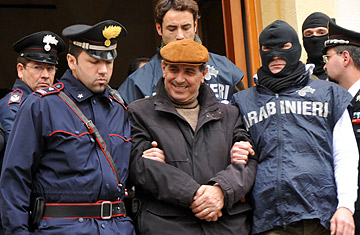
Italian Carabinieri paramilitary police officers on Tuesday, Dec. 16, 2008, escort a man identified as Giuseppe Scaduto, center, one of the 100 suspected mobsters arrested in Sicily, Italy
Much like a board of directors, or even a parent-teacher association, the Sicilian Mafia has been known to operate with a whiff of organizational democracy. In the past, La Cupola, a kind of consultative board of regional bosses, met from time to time to resolve internal disputes and forge long-term strategy.
It was an attempt to revive the Cupola that was the target of a sweeping Italian police raid Tuesday morning that stretched from Palermo to Tuscany and netted 94 people. (Read TIME's top 10 crime stories of the year.)
The operation, which involved more than 1,200 Carabinieri officers, was yet another blow to the upper echelon of Sicily's legendary crime syndicate, following the capture of the top two godfathers over the past two years. Though not household names in Italy like those captured in 2006 and 2007, many of the men arrested Tuesday are veteran mafiosi, including Salvatore Lombardo, the 87-year-old alleged boss of the town of Montelepre. The suspects face charges of extortion, weapons- and drug-trafficking and belonging to an organized-crime outfit.
Investigators say those taken into custody had been attempting to re-establish the authority of the Cupola to solidify the Mafia's power structure after a leadership vacuum had followed from the high-profile earlier arrests of Bernardo Provenzano and Salvatore Lo Piccolo. Leading anti-Mob magistrate Pietro Grasso said operations over the past few years have the Sicilian Mob, also known as Cosa Nostra, on its knees. Tuesday's roundup, Grasso said, "keeps it from getting up."
The Mafia has long fascinated the world with its mix of murder, mystery and Old World folklore. But the Mob is best understood as an organization constantly trying to consolidate its power in order to accumulate wealth. Considered the modern inventor of organized crime, the Sicilian Mob remains hugely powerful, even as its share of the international trafficking business has diminished and other syndicates have made headlines for their bloody turf wars. (Read a TIME cover story on the Mafia.)
Beyond money, the Mafia is a study in power. Provenzano withstood conditions of abject poverty in order to reign over a vast criminal network from the heartland of the Italian island. (A boss who flees his home turf with a suitcase of cash is, on the other hand, considered a failure and possible traitor.) Of course, power and money feed off each other: Provenzano, for one, never stopped working to acquire wealth for Cosa Nostra, even if he couldn't spend it himself. Despite the blows to its leadership, the organization still generates billions of dollars of annual turnover in extortion, public-works contracts and drug-trafficking.
The existence of the Cupola, taken for the Italian word for dome, first came to light in the 1960s and was confirmed by the turncoat witness Tommaso Buscetta, whose testimony to legendary magistrate Giovanni Falcone in the 1980s unlocked many of the Mafia's secrets. Allowing each family to remain autonomous in its own geographic area, the Cupola was effectively tasked with preventing disputes that would threaten the whole system.
The Cupola's sway is thought to have faded in importance under the reign of Salvatore (Toto) Riina in the 1980s, when the bloodthirsty boss of bosses wielded a more autocratic hand. The boss board is believed to have rubber-stamped the 1992 assassinations of Falcone and fellow magistrate Paolo Borsellino, but it was at the insistence of Riina, who would be captured the following year.
The arrest in 2006 of Riina's successor, Provenzano, left a potential battle for control. After the boss in line to take over, Lo Piccolo, was nabbed last year, Cosa Nostra decided it was time to reconstitute the Cupola for the difficult work of rebuilding the organization, authorities say.
Despite the success of Tuesday's sweep, there was one name missing from the list of those arrested: Matteo Messina Denaro, 46, a bespectacled multiple murderer with a reported weakness for sports cars, remains at large. If the Cupola does return, police say, Messina Denaro would be the unrivaled chairman of the board.
